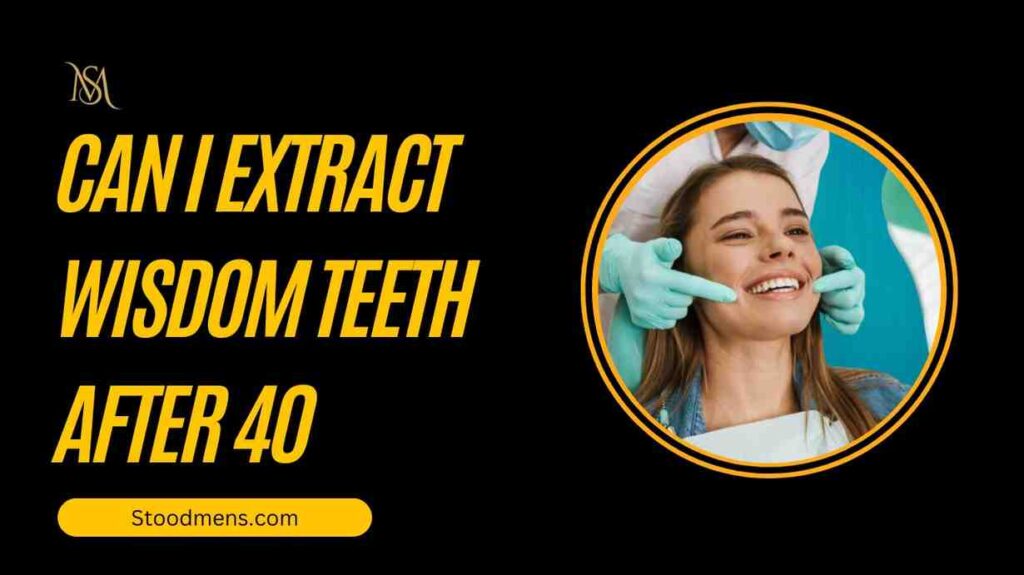Progressing through the years implies learning new things and having various encounters. Yet, once in a while, there’s an unexpected pausing: wisdom tooth issues. You could have heard that as you progress through the years, you get shrewder. Indeed, that is valid, but that’s not generally the situation with wisdom teeth. Indeed, even after your adolescent years, these teeth can cause surprising issues.
Welcome to our page, where we discuss whether I can extract wisdom teeth after 40 and what happens when you’re more established, particularly on the off chance that you’re over 40. At [Stoodmens], we’re specialists in dealing with your mouth. We know managing wisdom tooth issues can be interesting, particularly as you age. Stay with us as we make sense of what you can expect and how to deal with wisdom tooth inconveniences further down the road.
What reasons do wisdom teeth after 40 create issues?
Some could feel that once you’re past a particular age, your wisdom teeth after 40 won’t be an irritation any longer. Yet, that is false all the time. We should investigate why these teeth can create mischief sometime down the road:
- Teeth Moving: As you progress in years, your teeth can begin moving. This can make it difficult for your wisdom teeth to come in. They could stall out or cause pain since there isn’t adequate space.
- Gum Changes: As we age, our gums change as well. This can be a direct result of chemicals or the normal maturing process. These progressions can make our gums more defenseless to diseases. This can meddle with how our wisdom teeth come in and cause issues.
- Ailments: Certain medical conditions, like diabetes, can screw with our mouths. Diabetes, for instance, can make it harder for our bodies to ward off diseases, remembering those for our gums. Thus, on the off chance that you have a condition like this, your wisdom teeth could give you more difficulty.
- Not Dealing with Your Teeth: Skipping dental specialist visits or not focusing on your teeth at home can prompt issues with your teeth. Without customary check-ups, issues like depression or affected teeth can deteriorate over the long haul.
Understanding these reasons can assist us with taking care of wisdom teeth after 40 issues better and keeping our mouths solid.
Signs You Could Have Thinking Teeth Issues
While wisdom tooth side effects can be comparative, paying little heed to maturity, they might be introduced to more seasoned adults, making them easier to neglect.
Here are a few vital signs to know about:
- Agony or Uneasiness: You could encounter a range of sensations, from gentle yearning to extreme agony around the jaw or ears. This uneasiness can be steady or inconsistent, contingent upon the seriousness of the issue.
- Swelling: Seeing an expansion around the jaw region can be an obvious indicator that a wisdom tooth is affected or causing irritation. The swelling might be joined by delicacy or warmth in the affected region.
- Trouble in Eating: If you find yourself trying to bite your food without encountering pain or distress, it could flag an issue with your wisdom teeth after 40. This uneasiness might deteriorate while clamping down on more enthusiastic food varieties or applying strain to the affected region.
- Terrible Breath: A disease around a wisdom tooth after 40 can prompt persistent terrible breath, even with normal brushing and mouthwash use. This scent is often brought about by the development of microscopic organisms in the affected region and can continue despite endeavors to work on oral cleanliness.
- Trouble Opening Your Mouth: At times, a tricky wisdom tooth might confine the scope of movement in your jaw, making it challenging to open your mouth. This constraint can be joined by inconvenience or agony while endeavoring to open your jaw wide.
- Jaw Solidity: You might see firmness or snugness in your jaw muscles, particularly after getting up toward the beginning of the day or after times of delayed biting. This firmness can be a consequence of irritation or tension from affected wisdom teeth after 40.
It’s urgent not to disregard these signs, as postponing treatment can prompt further entanglements, for example, contamination, harm to encompassing teeth, and more extreme agony. If you experience any of these side effects, looking for brief dental consideration is vital for addressing the issue.
Is wisdom tooth extraction at 40 risky?
At the point when wisdom teeth after 49 arise, they face a packed mouth. When they show up, the jawbone and gums are created, and different teeth consume all the space. This makes it hard for wisdom teeth to adjust, making them stall out or develop.
At 40 or any age, skewed or secret wisdom teeth can present critical oral well-being chances:
- Tension on Adjacent Teeth: Underground wisdom teeth can push on adjoining teeth, making them slanted and the jaw skewed. This tension can trap food and microscopic organisms, prompting tooth rot and gum issues.
- Agony, Disease, and Expanding: Skewed wisdom teeth after 40 can cause pain, fever, and enlarged gums. In serious cases, they can prompt diseases, framing pockets of discharge and aggravation. Some might try and foster jaw pimples, which can hurt close to teeth and nerves.
- Distress and Nerve Strain: Enlarged gums from skewed wisdom teeth after 40 can cause uneasiness, influencing discourse and eating. They may likewise pack nerves, decreasing sensation in the affected region. In uncommon cases, they can cause redness and expansion around the eyes or mouth pain.
While wisdom teeth arising at 40 aren’t hazardous, issues like misalignment can have serious ramifications for oral well-being. Getting quick dental consideration is urgent to forestall further issues.
Can I extract wisdom teeth after 40?
Side effects and difficulties connected with wisdom teeth after 40 can occur at whatever stage in life. Specialists say, assuming you’re 40 and your wisdom teeth are positioned and don’t do any harm, you don’t have to get them taken out because they won’t hurt your teeth or your well-being.
In any case, it’s vital to keep your teeth clean by cleaning, flossing, and flushing with saltwater to stay away from diseases. If your wisdom teeth are stuck or developing the incorrect way and bringing on some issues like pain or expansion, you ought to see a dental specialist. Taking care of your wisdom teeth after 40 early can prevent them from causing greater issues.
Master Exhortation
At the point when wisdom teeth come in, it’s vital to have them looked at immediately. Specialists will decide if they should be taken out because they are so prone to creating issues. They’ll take great care of you and ensure you’re not in pain. The emergency clinic has the very best gear and keeps everything clean to ensure you stay sound.
Signs That You Might Have Thinking Tooth Issues
While wisdom tooth side effects can be compared across age groups, they might be available to more established adults, making them easier to neglect.
The following are six signs to look for:
- Pain or Uneasiness: This could go from gentle yearning to serious agony around the jaw or ears.
- Swelling: Perceptible swelling around the jaw can be an affected wisdom tooth.
- Difficulty in Eating: If you experience pain or uneasiness while biting, it could flag a wisdom tooth issue.
- Bad Breath: Contamination around a wisdom tooth can cause steady, terrible breath.
- Jaw Solidity: Firmness or restricted development in the jaw can be a sign of wisdom tooth issues.
- Headaches: Tenacious migraines, particularly in the sanctuaries or behind the eyes, might be connected with wisdom tooth issues.
Disregarding these signs can prompt further confusion, so looking for brief consideration from a dental specialist is vital for legitimate findings and treatment.
Beginning Treatment of wisdom teeth after 40
If you’re experiencing difficulty with your wisdom teeth after 40, begin by seeing an oral specialist for an examination. According to oral medical procedures, we’ll follow these means:
- First Arrangement: Converse with your oral specialist about your side effects and clinical history.
- Tests: take X-beams or 3D pictures to see what’s happening.
- Plan: Given what we find, we’ll make a treatment arrangement that could incorporate a medical procedure.
For treatment,
- Give You Anti-Microbials: Assuming there’s a contamination, we’ll give you medication to assist with clearing it up.
- Help with Agony: We’ll give you medication to assist with any aggravation or expansion.
- Teach You How to Focus on Your Teeth: We’ll tell you the best way to keep your teeth clean to stay away from more issues.
- Suggest Changes to Your Way of Life: Suggest staying away from specific food varieties that could exacerbate the situation.
- Offer eating regimen Tips: Eating delicate or fluid food sources can assist you with feeling improved while you recuperate.
- Check on You: We’ll plan follow-up visits to ensure you’re improving.
- Consider medical procedures: If different therapies don’t help, recommend a medical procedure to fix the issue.
Kinds of Wisdom Tooth Expulsion Method
The strategy used to cut a wisdom tooth can fluctuate depending on factors like its situation and intricacy. Here are the techniques suggested:
- Simple Extraction: This technique is direct and performed under nearby sedation. The tooth is slackened and taken out without the need for entry points.
- Surgical Extraction: When a wisdom tooth is affected or arranged in a troublesome position, a careful extraction might be important. This method might need general sedation and includes making an entry point in the gum to access and cut the tooth.
It’s vital to take note that wisdom tooth extraction for people north of 40 might need exceptional contemplation because of age-related factors, for example, changes in bone thickness and an expanded risk of nerve harm. Yet, at Oral Medical Procedure, we use advanced strategies and innovations to guarantee a protected and proficient therapy process for patients, everything being equal.
At this point, you ought to have a superior comprehension of why wisdom tooth issues might emerge after 40 and the underlying advances engaged in overseeing them.
Wisdom teeth removal after 40 recovery tips
After going through wisdom tooth extraction, the center wisdom teeth coming in pain moves to postoperative consideration, which is particularly significant for patients aged 40, as their bodies might take more time to recuperate compared with more youthful people. This is the very thing that you can expect during your recuperation:
- Prompt Aftercare: During the initial 24-48 hours following the method, keeping these rules for a fruitful recovery is vital:
- Pain Administration: You might encounter some level of pain or uneasiness. Your oral specialist will suggest pain relievers or over-the-counter calming prescriptions to deal with your discomfort.
- Dietary Changes: Stick to delicate food varieties and fluids to try not to come down on the careful site and help to recuperate.
- Oral Cleanliness: While you ought to keep away wisdom teeth coming in pain from enthusiastic washing, it’s fundamental to keep up with great oral cleanliness to forestall contamination.
- Transient Recuperation: During the first week after the oral procedure, you ought to start to feel quite a bit improved.
Here are moves toward guaranteeing ideal recuperation:
- Activity Impediment: Keep away from difficult proactive tasks for seven days to permit your body to mend.
- Regular Check-ups: Schedule your next encounter with your oral specialist to check your recuperating progress and address any intricacies that might emerge.
- Long-Haul Contemplation: While most patients recuperate within half a month, some might need longer-term care:
- Wholesome Improvements: Depending upon your wisdom teeth coming in pain prosperity, your expert could endorse taking supplement upgrades to assist with boning patching.
- Chronic Wellbeing Observing: Assuming you have persistent circumstances like diabetes, steady checking is fundamental to guarantee they don’t influence your oral well-being.
Dangers and Safeguards
While wisdom tooth extraction is a typical method, it’s fundamental to know about possible dangers, including:
- Infection: Appropriate aftercare is essential to preventing diseases at the extraction site.
- Dry Attachment: This difficult condition can happen assuming the blood coagulation at the extraction site is removed.
- Nerve Harm: Albeit uncommon, more established adults may have an expanded risk of nerve harm during the system.







3 thoughts on “Can I remove wisdom teeth after 40 Is it right?”